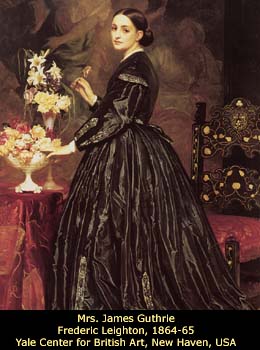Mrs. James Guthrie
Frederick Leighton, 1864-65
Victorian Neoclassicism
Yale Center for British Art, New Haven, Connecticut, USA
Frederick Leighton (1830 - 1896) - one of the most famous British painters
alongside Sir Joshua Reynolds (1723-1792) and Sir Thomas Lawrence (1769-1830)
was born in Scarborough, Yorkshire. He studied painting in atelier of
Edward von Steinle in Frankfurt (1850 - 1852), then with Giovanni Costa studio in Rome (1852 - 1855),
and in Paris (1855-59) where he encountered Ingres, Delacroix, Corot, Millet and acquainted
himself with their works.
He painted mythological, biblical and historical scenes as well as much variety of landscapes and portraits.
The sensation of the 1866 Royal Academy exhibition was the portrait of
"Mrs. James Guthrie" which belongs to the big collection of his most beautiful
decorative paintings.
This is carefully planned portrait composition shows all the qualities of Renaissance and Venetian sixteenth-century
portraits, in particular the portraits of the Veronese.
Mrs. Guthrie elegant figure is posed in front of decorative
background; probably tapestry showing a mythological or pastoral scene.
Her black silk Victorian style crinoline of early 1860s' forms a splendid bell-shaped pyramid of
irradiant black silk, interrupted by small gray patches of embroidered ornaments at the sleeve, shoulder and hem.
Her thick dark hair is tied back off her face. Her head is slightly tilted to the right of the picture and she
gazes out in the same direction. In her right hand she is holding a pink rose which collates with white lilies
in the elevated vase. Her left hand is
gently touching white vase containing variety of white, yellow and red roses. On her right side stands
realistically painted fine ebony chair inlaid with mother-of-pearl decorative ornament.
To emphasize the fragile beauty of her the portrait was painted with palette reduced
to sombre browns and blacks carefully balanced across the composition.
On either side of her black crinoline are patches of red-brown, in the cloth which
drapes the table and the seat cover of the chair. Her beautiful
melancholy-pale face appears at the centre of the painting, compositely supported by
the white tones of flowers and the inlaid ornament of the chair.
